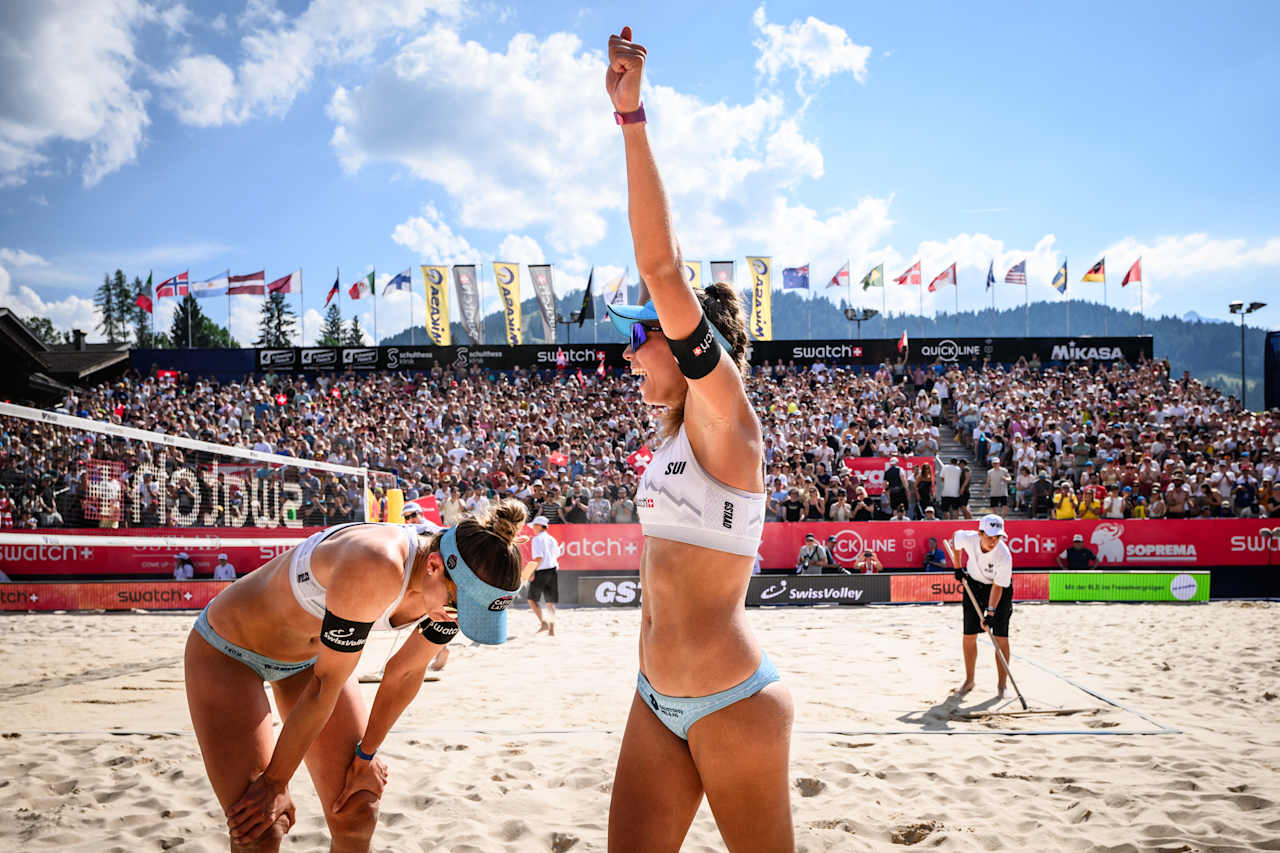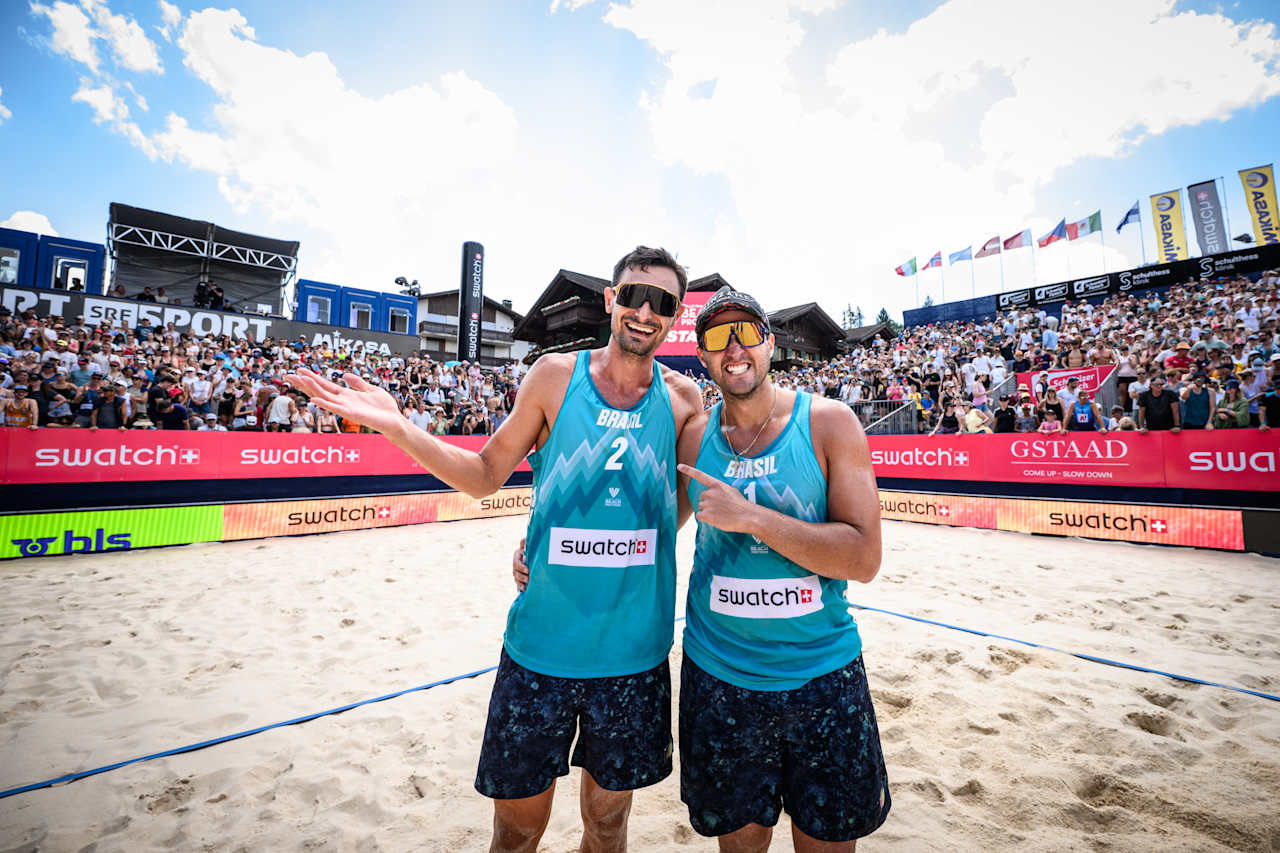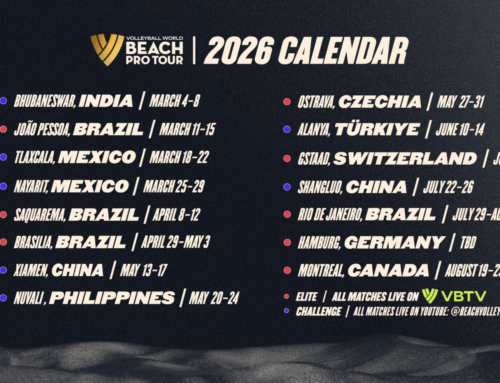GSTAAD, Switzerland – When Kristen Nuss and Taryn Brasher arrived in Switzerland for this week’s Volleyball World Beach Pro Tour Gstaad Elite, they were asked by a pair of familiar faces on the Volleyball World ops team if they were going to repeat their win from 2024.
“Oh, we don’t know, what do you think?” Nuss said.
She’s as humble as ever, Nuss, but then again, even if she were the most pompous and arrogant of athletes, how could she have known?
The last USA Volleyball team to repeat at Gstaad was Misty May-Treanor and Kerri Walsh Jennings in 2006 and 2007, when Nuss and Brasher were 10 years old.
Now, for the first time in nearly two decades, USA has a back-to-back Gstaad champ in Nuss and Brasher. They put on a tour de force at the most popular stop on the Beach Pro Tour this week, dropping just a single set, sweeping Tina Graudina and Anastasija Samoilova in the finals, 21-19, 21-18 in a match they controlled from the first point to the last.
“This place is just something special, so magical,” Nuss said.
The win came much easier this time around than their 2024 gold did. Then, they found themselves down 3-8 in the third set to Terese Cannon and Megan Kraft, grinding all the way back to steal the golden cowbell.
There was no grinding here. Not once.
Nuss and Brasher hit 34 less errors on the weekend than their opponents, pressuring one team after the next into swinging into Brasher, shooting into Nuss, trying to be perfect – and then hitting it out. It all added up to their second gold medal in three events, their fourth podium in five tournaments, and a third cowbell in just four tries in Gstaad.
So to answer the question they were posed at the beginning of the week: Yes, yes they can repeat.
They just did.

Volleyball World photo
Cherif Younousse, Ahmed Tijan finally win Elite gold
The very first Elite16 event was held in Rosarito, Mexico, in March of 2022. That was won by Cherif Younousse and Ahmed Tijan, the top seed who lived up to the billing.
They haven’t won an Elite since.
That changed on Sunday in Gstaad, when the Qataris swept the surprise contenders from Sweden, young Jacob Holting Nilsson and Elmer Andersson, 21-19, 22-20, to win not only their first Elite in three years, but their first golden cowbell in Gstaad.
“They played well since the tournament started. We were expecting everything and we managed to do it 2-0,” Cherif said. “We knew they are able to do it, at this level, it’s not an easy team. Twenty-four of the best teams in the world. You have to expect everything.”
What was unexpected was a 20-15 lead – five gold medal points – that vanished in a flurry of Holting-Nilsson blocks, tying it up 20-20. A clutch Tijan sideout led to a Tijan dig and conversion on a monstrous angle swing to seal up their second gold medal of the season after opening with a win at the Xiamen Challenge.
In just three events this year, Tijan and Cherif have won two, finishing fifth at the Ostrava Elite, where their only loss came in the quarterfinals to Ondrej Perusic and David Schweiner.
“I want to thank this amazing crowd,” Cherif said. “You guys make us feel at home here. And not just today, or last month, but ever since we came here in 2021, whether we are playing the best team in the world against Norway, against Brazil, you guys support us. Thank you.”

Marco Krattiger celebrates/Volleyball World photo
Other notes and thoughts from the Gstaad Elite
Maybe shit does make the best fertilizer
Two months ago, at the Xiamen Challenge, Kylie DeBerg and Toni Rodriguez were coming off a stretch of six straight losses and back-to-back-to-back nineteenth-place finishes.
“Not winning a pool game in those three Elites was hard, hard mentally, hard volleyball wise – is this what we should be doing?” DeBerg said recently on an episode of SANDCAST. “So many question marks.”
And then, at the most unexpected of times, they answered all of them, winning their first gold medal as a team and the first of DeBerg’s career.
Last week, at the Stare Jablonki Challenge, Marco Krattiger and Leo Dillier did the same. Like DeBerg and Rodriguez, they entered that event on the heels of two straight last place finishes, one a qualifier knockout at the Alanya Challenge, the other a barbeque out of a Futures at home in Geneva.
Cue the explosion.
Krattiger and Dillier won five straight matches in Poland, including a spectacular seven-point comeback in the finals, to win gold, stunning Bartosz Losiak and Michal Bryl in their home event. Perhaps proving it was no fluke, they stayed hot this week in Gstaad, upsetting the 2023 World Champs, Ondrej Perusic and David Schweiner, in the first round of the main draw pool play, proving the age-old adage to be a sage bit of wisdom indeed: Maybe shit does make for the best fertilizer.
Krattiger and Dillier followed up that win with another upset over Brazil’s Evandro and Arthur to win pool, securing a ninth-place finish, making for two top-10s for the Swiss men, one of the strongest showings the home federation has put on in years.
“Two incredibly emotional weeks are coming to an end,” Krattiger said. “It‘s going to take a while to let it all sink in.”
They weren’t the only ones to use a little fertilizer for good, either.
Tina Graudina and Anastasija Samoilova, the aforementioned silver medalists, were coming off a fifth-place finish at their home event, a Futures in Jurmala in which they were heavily favored to win gold. Instead, they were swept twice and finished fifth, no doubt reeling coming into the most important event on the Beach Pro Tour calendar.
They used it for good, earning their highest finish in Gstaad and a second cowbell to put on the shelves.

Tanja Huberli and Leona Kernen celebrate/Volleyball World photo
Leona Kernen is the real deal
When Nina Brunner announced that she was pregnant and would be out for the foreseeable future – she is now a Boy Mom, congrats to her – it was fair to wonder how Tanja Huberli would fare without one of the world’s best defenders behind her.
Turns out, pretty well.
In 19-year-old Leona Kernen, Huberli has found Brunner’s young mini-me. It’s eerie, though hardly coincidental, that Kernen’s game would resemble so much of Brunner’s, from their passing platforms to their angled approaches on the right side even down to a signature sharp angle chop. It would have been easy, too, to dismiss their early success – a silver at the season-opening Yucatan Challenge and a fifth the following week at the Quintana Roo Elite – as a honeymoon phase of sorts. But they’ve sustained it, winning gold at home at the Spiez Futures, where they swept Anouk Verge-Depre and Zoe Verge-Depre in the finals, won pool in Ostrava before taking ninth, and pushed into the semifinals in Gstaad, where they finished fourth in the first all-Swiss bronze medal match in Gstaad history.
Kernen’s game will only continue to evolve, but in chatting with Brunner and assistant coach Mirco Gerson – a 2021 Olympian and excellent defender and jump server – it is her mindset that sets her apart. She’s confident, spunky, fiery on the court and perpetually smiling off it. Even down big in the bronze medal match, which she’d lose, 21-17, 21-11, mentally, she was never out of it.
That’s rare from such a young player, especially competing in her first Gstaad main draw.
Four months into her rookie season, where she is the leader by a country mile for Rookie of the Year, it’s safe to say that Kernen is the real deal.

Jacob Holting-Nilsson serves/Volleyball World photo
Elmer Andersson, Jacob Holting-Nilsson set new bar for youth talent
Leona Kernen, unbelievably enough, wasn’t the only teenager making it to Sunday in Gstaad. Sweden’s Jacob Holting-Nilsson and 19-year-old defender Elmer Andersson began this tournament on the reserve list. Less than a week prior to the event, they weren’t sure they’d be playing at all.
Then they slipped in at the eleventh hour and took out former Gstaad champs Marco Grimalt and Esteban Grimalt to make the main draw. They survived through pool, squeaking past USA Volleyball’s Chaim Schalk and James Shaw, and it was off to the races from there, sprinting past Latvia’s Martins Plavins and Kristians Fokerots, putting an end to the charmed run of Marco Krattiger and Leo Dillier, sweeping Evandro and Arthur in the quarterfinals and then stumping George and Andre, who were making a charmed run of their own, in the semis.
Suddenly, Sweden – a different Sweden than the one we’re so accustomed to seeing in these Elite finals – was playing for the most unlikely of gold medals, becoming the youngest team in Beach Pro Tour history to play for an Elite gold medal.
Consider this the last final that could be considered unlikely.
At 19 and 20 years old, Andersson and Holting-Nilsson are the newest – and youngest – problem on the Beach Pro Tour.
Gstaad: A tournament of breakthroughs
Young Sweden, as we have so dubbed Elmer Andersson and Jacob Holting-Nilsson, are hardly the first to break through here in Gstaad. This venue has actually become home to some of the biggest breakthroughs in recent memory. In 2018, Anders Mol and Christian Sorum won their first event here, kicking off an historic run of three straight major wins, following up with golds in Vienna and Hamburg, pocketing more than $200,000 in prize money in three weeks. Stefan Boermans and Yorick de Groot, too, picked up their first win here, in 2021 as the 15 seed and on the cusp of qualifiers.
They haven’t played in a qualifier since. Alvaro Filho, too, won his first gold here, in 2013 as a pup alongside Ricardo Santos. He then became one of the best defenders of his generation.
So it is for Young Sweden and Leona Kernen: A venue for breakthroughs.

Anouk Verge-Depre goes up for a block against Tanja Huberli/Volleyball World photo
Anouk Verge-Depre: More than a monster block
For the last two years, Brandie Wilkerson has won the Blocker of the Year award by the largest margin of any other award – more than Anders Mol on the men’s side, more than Evandro with serving, more than anyone in any category. For the first time in recent memory, she has competition, from Anouk Verge-Depre, a 33-year-old who has been playing defense for the last seven years.
Verge-Depre’s blocking is what ultimately led her and youngster sister Zoe Verge-Depre to their first medal as a team last month, a bronze medal at the Ostrava Elite. Her 30 blocks led the tournament, finishing with 19 more than Wilkerson, and four more than Italy’s Valentina Gottardi.
Prior to our interview on center court after her bronze medal win, in which she had seven blocks, I told her how impressed I was with her blocking.
“I missed it,” she said, smiling.
Clearly.
In Gstaad, Anouk again led all players in blocks, finishing with 35, leading the field by 12.
In their quarterfinal match, against Germany’s Sandra Ittlinger and Anna-Lena Grune, Anouk notched 10 blocks in a 21-10, 21-19 win, a number that would rank ninth in the tournament for total blocks. It’s a performance that her coach dubbed, fittingly, “more than a monster block.”
What’d she do in the bronze medal match, against Leona Kernen and Tanja Huberli? Tacked on another six, securing the first Swiss medal in Gstaad since 2012.

Andre and George/Volleyball World photo
Andre Loyola: King of the sabbatical
Andre Loyola has not been playing much beach volleyball in 2025. I’m not sure, outside of a fun appearance at a King of the Court, he’s been playing any at all.
No matter.
He and George Wanderley, best friends and former partners, decided to run it back in Gstaad this week, a venue where they’d won two straight cowbells, and see what might happen.
Turns out, magic happened.
George and Andre came out of the qualifier and ran straight into the semifinals, stunning Anders Mol and Christian Sorum in the process, knocking the Vikings out in the quarters, the most unbelievable result in a weekend replete with them. There ended the fairy dust, as they’d drop the final two matches in Switzerland, but who would finish leading the tournament in blocks?
None other than Andre, the man channeling his inner Allen Iverson, because practice? We talkin’ ‘bout practice?
Andre, evidently, doesn’t need much practice.
Happy birthday, Yorick de Groot
What do you get a 25-year-old young man for his birthday?
A bronze cowbell seems a good place to start.
Yorick de Groot turned 25 on Sunday, and to celebrate, he and Stefan Boermans won their second medal of the season, a bronze with a win over George and Andre.
Gstaad continues to be a special place for the Dutch, as this mountain valley is also home to their first gold medal as a team.


